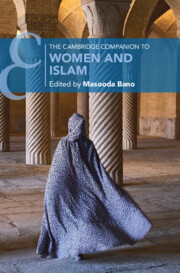Book contents
- The Cambridge Companion to Women and Islam
- Cambridge Companions to Religion
- The Cambridge Companion to Women and Islam
- Copyright page
- Contents
- Contributors
- Preface
- A Note on Foreign-Language Words
- Introduction
- Part I Logic of Classical Reasoning
- Part II Asserting Agency in Faith
- Part III Asserting Agency in Socio-Political Life
- 11 Patrons of Art, Architecture, and the Urban Environment
- 12 Women and Political Authority
- 13 Women as Social Activists
- 14 Poets and Writers
- 15 ‘Feminist Spirituality’ as Lived Religion
- Volume Bibliography
- Index
- Cambridge Companions To … (continued from page ii)
- References
14 - Poets and Writers
from Part III - Asserting Agency in Socio-Political Life
Published online by Cambridge University Press: 12 April 2025
- The Cambridge Companion to Women and Islam
- Cambridge Companions to Religion
- The Cambridge Companion to Women and Islam
- Copyright page
- Contents
- Contributors
- Preface
- A Note on Foreign-Language Words
- Introduction
- Part I Logic of Classical Reasoning
- Part II Asserting Agency in Faith
- Part III Asserting Agency in Socio-Political Life
- 11 Patrons of Art, Architecture, and the Urban Environment
- 12 Women and Political Authority
- 13 Women as Social Activists
- 14 Poets and Writers
- 15 ‘Feminist Spirituality’ as Lived Religion
- Volume Bibliography
- Index
- Cambridge Companions To … (continued from page ii)
- References
Summary
Zuzanna Olszewska explores the poetic and literary agency of Muslim women across time and genres. The chapter reviews both literary and anthropological studies that have deepened our understanding of the importance of written scholarship and oral poetry produced by Muslim women. It also presents a case study of Muslim female poets of Afghani origin now living in the diaspora.
- Type
- Chapter
- Information
- The Cambridge Companion to Women and Islam , pp. 338 - 358Publisher: Cambridge University PressPrint publication year: 2025

